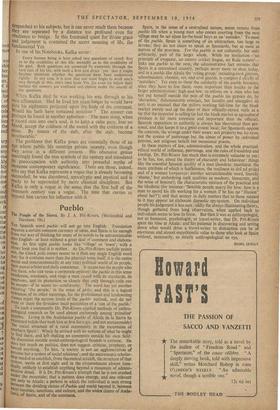THE Spanish word pueblo will not go into English. Translation
„l'equires a certain common currency of ideas, and Spain is far enough irom our way of thinking for many of its words to be untranslateable into English—at least without a great deal of comment and elabora- tion. At first sight Pueblo looks like village' or 'town': with a Closer look you find it is neither. As Dr. Pitt-Rivers usefully points out, the Greek polls comes nearer to it than any single English word Can: for it contains more than the physical town itself, it is the entire Eocial and (microcosmically at any rate) political world a its people, their moral arbiter and daily conscience. It means too the people who live there, who can voice a corporate opinion: the pueblo in this sense Condemns, condones, and rings a man round with its standards, its .8anctions, and its protection so closely that only through exile can escape—if he wants to—conformity. The word has yet another Meaning: 'the people,' in the sense of plebs; and this is a logical extension of its other meanings, for the professional and landowning classes reject the narrow limits of the pueblo outlook, and do not want or share the ferocious local patriotism of a 'son of the pueblo.' To such a community Dr. Pitt-Rivers applied methods of anthro- pological research so far used almost exclusively among 'primitive` Peoples. Living in the Andalusian pueblo of Alcala de la Sierra he examined (while they took him at first for a spy, and not unreasonably) the social structure of a rural community in the mountains of southern Spain'. Wisely he arrived with no notions of what'he ought !ci find there, and left making no comments outside his own field: His discretion outside social-anthropological bounds is extreme. He ;to( s not touch on politics, does not suggest, criticise, prophesy, or bewail anything. To him, 'a society is not an agglomeration of Persons but a system of social relations'; and the microscopic scholar- ship needed to establish, from theoretical scratch, the structure of that ,SYsieM, seems at first sight and in the circumstances almost luna- gePlly unlikely to establish anything beyond a mountain of admini- strative detail. It is Dr. Pitt-Rivers's triumph that he is not crushed under the mountain; that a pattern does emerge, and one relevant Poi only to Alcala: a pattern in which the individual is seen strung ?eiV•icen the dividing claims of Pueblo and world beyond it, between Peal loyalties, sanctions, and culture, and the wide, ,laims of Anda- lusia, of Spain, and of the continent. Spain, in the sense of a centralised nation, seems remote from pueblo life when a young man who comes courting from the next village may be set upon by the local boys as an 'outsider.' To most of the pueblo, Spain is something of an abstraction, too large to invoke: they do not claim to speak as Spaniards, but at most as natives of the province. For the pueblo is not culturally, but only arbitrarily, part of the larger whole. While no institution—' no principle of exogamy, no county cricket league, no Kula system'— links one pueblo to the next, the administrative fact remains that Spain is a centralised country, perhaps never more so than today, and in a pueblo like Alcala the 'ruling group,' including even iioctors, schoolmasters, chemist, vet, and civil guards, is compos( d ch:cfly of 'outsiders.' Yet even to these the solidarity of the pueblo becomes, since they have to live there, more important than loyalty to the larger administration: high and low, to inform on a man who has not put himself outside the pale of the pueblo (as gypsies do, by 'shameless,' dishonourable conduct, but bandits and smugglers do not) is so unusual that the millers working full-time for the black market merely seal up the door of their officially-closed mills at a tip that the inspector is calling (in fact the black market in agricultural produce is far more extensive and important than the official). Spanish opposition to authority is always less theoretical than per- sonal, and this keeps it to a great extent local; for Spaniards oppose the concrete, the wrongs under their noses: not property but los rkos, not the system of patronage but the abuse of power by individual patrons, not religious beliefs but occasional priests.
In these matters of law, administration, and the whole practical- ethical world of influence, patronage, and the rules of friendship and kinship, Dr. Pitt-Rivers has much that is extremely valuable to say; as he has, too, about the theory of character and behaviour: things like the essential Spanish quality of a man (hombria: manliness, the main attribute of which is fearlessness, the readiness to deft nd pride) and of a woman (verguenza: another untranslateable word, literally .'shame,' but embodying such qualities as modesty, innocence, and the sense of honour); the characteristic mixture of the practical and the idealistic (for instance: 'Sensible people marry for love: how is a man to spend his life working for a woman if he has no "illusion" about her?'); and that secrecy in daily matters that to those unused to it may appear an elaborate domestic spy-system. On individual people his judgement is less sure: oddly the always illuminating theory, though gathered from long observation, when applied back to individuals seems to lose its force. But then it was as anthropologist, not as humanist, psychologist, or travel-writer, that Dr. Pitt-Rivers spent his time at Alcala: and his patience in discovering and setting down what would drive a travel-writer to distraction can be of enormous and almost encyclopedic value to those who look at Spain without, necessarily, so strictly anthropological an eye.
ISABEL QUIGLY


































 Previous page
Previous page